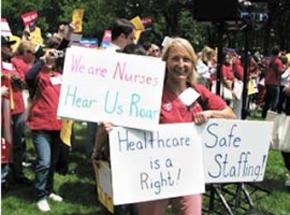Nurses make their voices heard
, a CNA/NNOC member in Chicago, reports from Washington, D.C., on the national RN days of action.
FOUR HUNDRED nurses from across the country descended on Washington, D.C., May 12 and 13 as part of national RN days of action to rally and lobby around issues affecting our work environment and patient care.
The event made national headlines when five nurses were arrested while protesting at Senate Finance Committee hearings on health care reform on May 12. Other doctors and nurses at the hearings stood up and turned their backs on the front of the room.
The Finance Committee is chaired by Sen. Max Baucus, who has received more campaign contributions from HMOs and drug companies than any other Democrat. Not surprisingly, he has solicited testimony from every possible part of the health care industry, but excluded supporters of a single-payer system that would cover everyone in the country with an expanded Medicare-like program.
That means excluding providers on the front lines of health care delivery across the country, who daily bear witness to the crisis of our so-called health care system--and who see a single-payer system as a solution.

A week before, eight doctors and other health care activists protested Baucus' committee hearings and were arrested. The eight were present again at the nurses' protest May 12, wearing T-shirts that read on the front, "Put Single-Payer on the Table"--and on the back quoted Baucus' response to the protest last week: "We Need More Police."
As one of the arrested nurses, Sue Cannon, a member of the California Nurses Association/National Nurses Organizing Committee (CNA/NNOC) from San Francisco, said in an interview:
We've already tried the proper channels. We've tried talking to our senators. We've faxed them and e-mailed them and called them--thousands of people have done those things, and the single-payer issue is still shut out. They've forced us to civil disobedience. We stood up for our patients, for decent health care, for fair health care, for single-payer to have a seat at the table.
THE TWO-day event, held in conjunction with the end of National Nurses Week, ended with a mass rally on the steps of the Capitol building, followed by nurses going in to lobby their senators and representatives to back the Employee Free Choice Act, single-payer and patient-nurse staffing ratios.
Recently, the CNA/NNOC merged with several statewide nursing unions and a national nursing union federation, the United American Nurses, to create an organization of 200,000 nurses, with national reach. The goal is to build a stronger and more unified movement to fight for the rights of nurses and win progressive legislation.
Members and leaders of the Service Employees International Union's Nurse Alliance, representing 85,000 nurses, were also part of the events, which is a significant change from the recent past, when CNA/NNOC and SEIU battled each other over allegations of raids on each other's members.
Before the cease-fire, in Chicago, SEIU was campaigning to decertify NNOC nurses at the Cook County Bureau of Health System, and CHEU (an affiliate of CNA/NNOC) was doing the same with SEIU janitors, laboratory technicians and other ancillary workers.
These campaigns were brought to an abrupt stop with the peace deal a few months ago--a welcome development that means efforts can now be focused on fighting for good contracts at Cook County, and not inter-union battles.
In Washington, Dian Palmer, an SEIU executive vice president and head of SEIU's Nurse Alliance, declared, "Together, we are unstoppable." Beth Piknick, president of the Massachusetts Nurses Association, which is part of the new merger involving the CNA, agreed, saying, "We need to come together, we need to bury the hatchet, bury our egos, and bury all those initials, for the good of our patients."
Health care reform was naturally on the minds of those who came to Washington, but there isn't a consensus on what kind. The CNA/NNOC is firmly behind single-payer, but other unions and federations are following the safe-bet strategy of endorsing every proposal for health care reform, while mobilizing for none.
Thus, at the beginning of the two days of action in D.C., AFL-CIO President John Sweeney made a vague call for comprehensive reform. And a recent survey sent out by the AFL-CIO, of which the CNA/NNOC is a member, didn't even list single-payer as an option in polling people about what sort of health care reform was needed.
Nurse-to-patient ratios are another major issue. Currently, ratios are only part of state law in California--on a regular floor there, nurses can have no more than five patients. This law has had a significant effect on patient care and safety as well as working conditions for nurses. Studies show a direct relationship between nurse-to-patient ratios and the outcomes of patient care.
California Sen. Barbara Boxer told the nurses gathered in Washington about legislation she has just introduced that would mandate nurse-to-patient ratios across the country. It would also fund the education of new nurses and make it a right of nurses to aggressively advocate on behalf of their patients, protecting them against hospital retaliation if they blow the whistle on unsafe practices.
Another major rallying cry here was EFCA, based on the experience of several successful and unsuccessful nurse organizing campaigns. The vast majority of the 2.9 million nurses in this country are non-union, and their working conditions desperately demand representation.
Several nurses from unorganized hospitals were part of the events. Elsie Melvin, from Mount Sinai Hospital in Chicago said, "We need a union really bad because of management issues, for equality and justice." NNOC lost an election at Mount Sinai last summer after a yearlong anti-union campaign of intimidation and lies by management.
The Obama administration has been painfully quiet on the issue since taking office, and the message here was that we can't be silent because our future is at stake.


